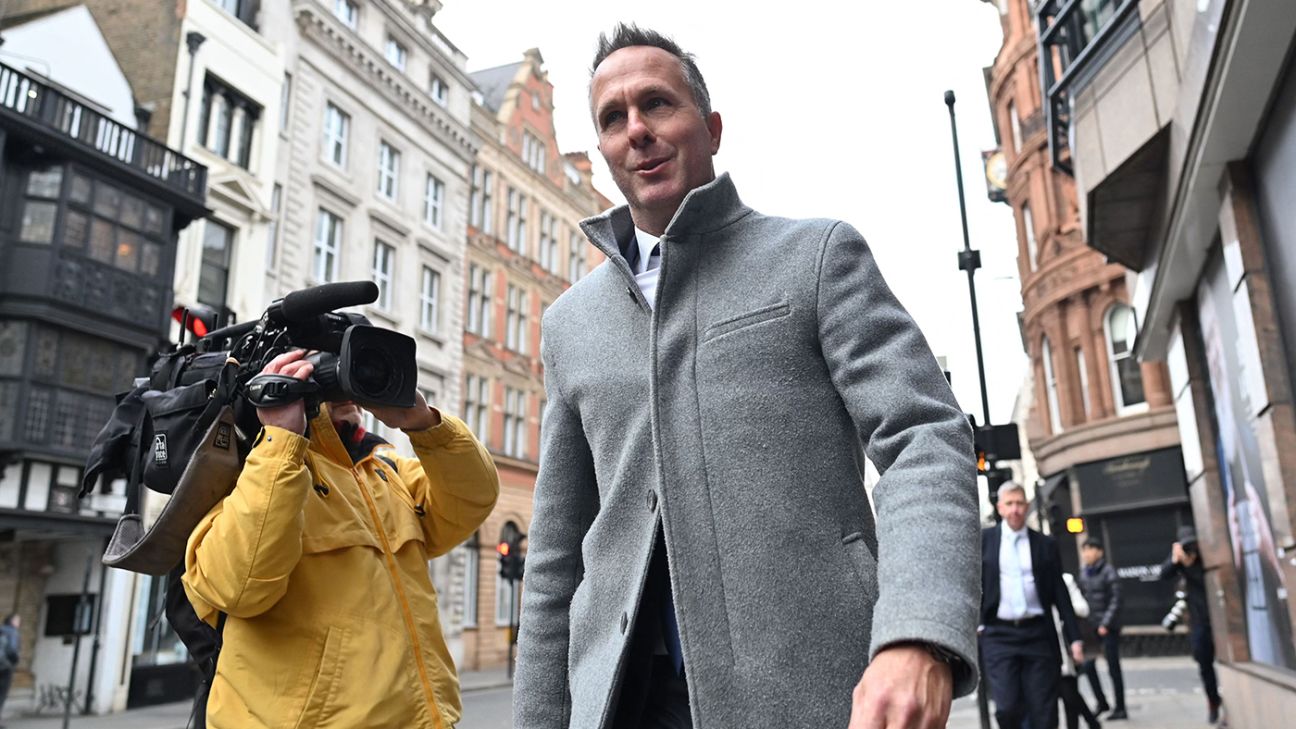Vaughan, appearing at the Cricket Discipline Commission (CDC) hearing in London, said of the day in question that he had “a very clear mind about back in 2009” and that he knew he did not say what had been alleged. He added that he would never have gone on to the field and said something to team-mates that could “put them in a bad state of mind” before the game.
“Knowing me in 2009, that’s not the sort of thing I would’ve said.”
Vaughan was questioned by the ECB’s lead counsel Jane Mulcahy KC for nearly 90 minutes, during which she argued that some historical tweets of his were “remarkably similar in tone” to the alleged remarks.
Vaughan said the tweets were unacceptable and that he had apologised for them before and would continue to do so. But he disagreed with the suggestion that they were similar in tone. Mulcahy pointed out that both Rafiq and Rashid claimed Vaughan likely made the alleged comment as a “bad joke” and said the tweet was similar in tone because it was “lighthearted but offensive”.
Asked if he agreed, Vaughan said: “No.”
Vaughan said he was “disgusted” with the tweets. “I apologised for them. I put myself on an online course, Inclusion. I wanted to lead the game in knowing how to lead in modern times. The tweets are disgusting, awful, and other words you could use. But the most important thing is I have said sorry and I am learning from them. As I say, if I get things wrong in my life, I stick my hands up.”
He went back to his recollection of the day of the game – which he has written about in his memoir – that he “could not have been more proud [of] four Asian players, three of whom had come through the system.”
Vaughan was also questioned about his meeting with Rafiq in November 2021 saying he felt the need for it because “the whole situation was escalating out of control”. Vaughan said he was apologetic in the meeting with Rafiq because he was “disgusted” by what Rafiq had to go through at Yorkshire but did not accept he made the alleged comment.
Vaughan: ‘Team-mates fighting it out terrible for game’
Vaughan said that the CDC hearing was a “terrible look” for cricket. “It’s not been easy for anybody. This is not the right process to deal with word-against-word comments from 14 years ago. Ex-team-mates fighting it out over hearsay is a terrible look for the game and a really bad look on how cricket has dealt with this situation.”
Earlier in the morning, scrutiny fell on the ECB’s scope in the investigation of the incident as well as the rigour deployed, with Meena Botros, its director of legal and integrity, facing a three-hour grilling from Christopher Stoner, Vaughan’s lawyer.
The line of questioning took in a recent interview with Lord Kamlesh Patel, the outgoing Yorkshire chair, in Eastern Eye. In it the claim was made that the ECB had “urged” Lord Patel to “get rid of people” at the county when he took over. Talking about his role, Patel said: “I was asked by the ECB to meet a set of criteria that most people would have winced at, would have thought there’s no way we can deliver this, and I delivered it.
“I was asked by the ECB to work with them to create a framework and an environment where we would prove to the world that we want a non-racist institution, and I did all that. I was asked by the ECB to ensure some people who were there from the previous regime did not take part in that governance process, very clear about that.”
Stoner suggested those comments showed that the ECB was “actively involved” in the Yorkshire investigation, in breach of the process as described in Botros’ witness statement, that the ECB remained independent of action being taken by one of its counties in such matters.
Botros said he couldn’t talk about what Lord Patel had said but insisted that Stoner was “mistaking” the ECB’s regulatory function in getting involved, from its other roles in such cases. Stoner pointed to Botros’s witness statement which read: “In its capacity as a regulator, the ECB must remain independent of action being taken by one of its member first-class county clubs.”
“That’s just not what happened, is it?” Stoner asked.
Botros replied: “It is what happened.”
Stoner then zeroed in on the day Vaughan is alleged to have made the remark, questioning whether the ECB could and should have gone further in its investigations of events. He confirmed with Botros that the only players the ECB had spoken to about the incident were Adil Rashid and Ajmal Shahzad.
Stoner asked why all Yorkshire players that day weren’t spoken to. Botros said the ECB “did speak to the individuals where we were able to” but that “certain individuals either didn’t want to take part or engage”, or that the ECB “weren’t able” to get contact details for others.
Stoner also asked Botros why the on-field umpires that day had not been contacted by the ECB for their version of events.
“There is no suggestion that the umpires were close enough to hear it,” Botros replied. Botros added that if it was such an important point, Vaughan’s team could have taken it on themselves.
The hearing is scheduled to end next Tuesday.
Osman Samiuddin is a senior editor at ESPNcricinfo
